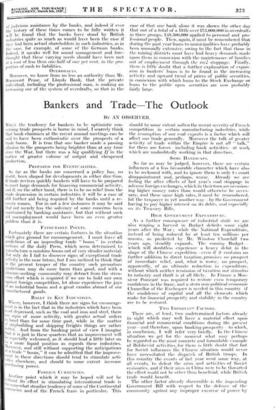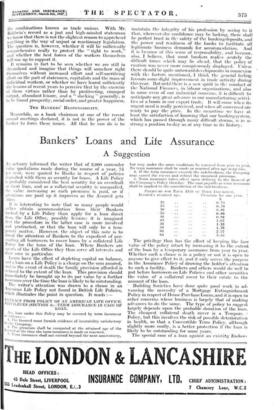Bankers and Trade The Outlook
By AN OBSERVER.
WuKx the tendency for bankers to be optimistic con- cerning trade prospects is borne in mind, I scarcely think that hank chairmen at the recent. annual meetings can be o said to have been enthusiastic over the prospects of a trade boom. It is true that one banker made a passing allusion to the prospects being brighter than at any time since the War, but there was a big qualifying If in the matter of greater volume of output and cheapened production.
PREPARED FOR EVENTUALITIES.
So far as the banks are concerned a policy has, no doubt, been shaped for developments in either direction. If trade revives quickly bankers will have to be prepared to meet large demands for financing commercial activity, and if, on the other hand, there is to be no relief from the trade depression in certain industries it will be a case of still further aid being required by the banks until a re- covery comes. For in not a few instances it may be said that not merely has the solvency of some concerns been maintained by banking assistance, but that without such aid unemployment would have been an even greater problem than it is.
FAVOURABLE POINTS. •
Fortunately there are certain features in the situation which give ground for encouragement. I must leave all predictions of an impending trade " boom " to certain sections of the daily Press, which seem determined to manufacture a-sunshine boom out of very slender material. Not only do I fail to discover signs of exceptional trade activity in the near future, but I am inclined to think that in the present temper of the country such premature predictions may do more .harm than good, and with a pleasure-seeking community may detract from the stren- uous effort which is required-if -we are to hold our own against foreign competition, let alone experience the joys of an industrial boom and a great exodus abroad of our nanufactured goods.
RALLY IN KEY INDUSTRIES.
Where, however, I think there are signs for encourage- ment is in the fact that in the industries which have been most depressed, such as the coal and iron and steel, there are signs of more activity, with greater actual orders in hand than for some time past, while in the matter ;Jr shipbuilding and shipping freights things are rather better. And from the banking point of view I imagine that it is just in these quarters that an improvement will to especially welcomed, as it should lead a little later on to a more liquid position as regards these industries. iloreorer, and still without supporting the anticipation's or a trade " boom," it can he admitted that the improve- ment in these directions should tend to stimulate acti- vities elsewhere, and should to some extent increase lalrehasing power.
FOREIGN CURRENCIES.
mother point .which it may be hoped will not be Without its -effect in stimulating -international trade is he so- mewhat steadier tendency of some of the Continental "'envies and-of the French franc in particular. This should to some extent soften the recent severity of French competition in certain manufacturing industries, while the resumption of our coal exports is a factor which will affect our trade generally. Moreover the talk of greater activity of trade within the Empire is not " talk," for there are forces—including bank activities-- at work which are undoubtedly working in that direction.
Soul: HAxmcAies.
So far as may be judged, however, there are certain influences of a less favourable character which have also to be reckoned with, and to ignore them is only b court disappointment and, perhaps, worse. Already we are feeling the after effects of last year's coal stoppage in adverse foreign exchanges, which in their turn are occasion ing higher money rates than would otherwise be neces- sary, and these same high rates, it must be remembered, hit the taxpayer in yet another way—by the Government having to pay higher interest on its debts, and especially on its Treasury Bills.
limit GOVER NM ENT EXPEN DITU As a further consequence of industrial strife we are also reaping a harvest in Budget deficits some eight years after the War ; while the National Expenditure, - instead of being reduced by at. least ten millions per annum, as predicted by Mr. Winston Churchill two years ago, steadily expands. The coming Budget-- which will doubtless experience a heavy debit in the shape of the Chinese expedition--even if it contains no further addition to direct taxation, promises no prospect of immediate relief, 'and, what is worse, no prospect, apparently, of an ultimate reduction in expenditure, without which neither remission of taxation nor stimulus to industry and thrift is at all likely. In France a Mon- sieur Poineare was required to restore even temporary confidence in the franc, and a stern non-political economic Chancellor of the Exchequer is needed in this country i f the confidence of capital and all the elements which make for financial prosperity and stability in the country are to be restored.
Two Rmier.%x-s FAc'rons.
There arc, at. least, two undetermined factors already in sight which may well have a material effect upon financial and commercial conditions during the present year—and therefore, upon banking prosperity- --to which, in conclusion, I will refer very briefly. Iu the Chinese situation we get for the moment what may perhaps be regarded as the most concrete and formidable example of Bolshevist activities, for there is little doubt that but for Soviet influences the Chinese situation would never have necessitated the dispatch of British troops. In this country the events of last year went some way, at all events, to defeat the aims and activities of Soviet emissaries, and if their aims in China were to be thwarted the effect could not he other than beneficial, while British trade would benefit.
The other factor already discernible is the impending Government Bill with respect to the defence of the community against any improper excceise of power by the combinations known as trade unions. With Mr. lialdwin's record as a just and high-minded statesman we know that there is not the slightest reason to apprehend anything in the. way of unjust or reactionary legislation. The question is, however, whether' it will sufficiently comprehensive really to protect the " right to work," and whether the best forces of the workers themselves will rise up to support it.
It remains in fact to be seen whether we are still in dreamland and imagine that things will somehow right themselves without increased effort and self-sacrificing effort on the part of statesmen, capitalists and the mass of individual workers, or whether we have learnt sufficiently the lessons of recent years to perceive that by the exercise of those virtues rather than by profiteering, cramped output, abundant leisure, and a " slacking " generally, is to be found prosperity, social order, and greater happiness.
TUE BANKERS' RESPONSIBILITY.
Meanwhile, as a bank chairman at one of the recent annual meetings declared, it is not in the power of the banker to force these issues. All that he can do is to maintain the integrity of his profession by seeing to it :that, wherever else confidence may be lacking, there shall be perfect trust in tin safety of the banking deposits, and the power and readiness of the. banks to facilitate all 'legitimate-.business demands for. accommodation, And it is because of this sense of responsibility, and because, also, I believe, that most bankers realize acutely the ,difficult times which may lie ahead, that the policy of • caution was never more conspicuously displayed. Unless :there should be quite untoward developments in connexim with the factors mentioned, I think the general feeling -favours some slight improvement in trade activity during 7this year. But until there is a new spirit in th' conduct of the National Finances, in labour organizations, and also in some even of our- industrial concerns, it is difficult to anticipate any great advance in our manufacturing activi- ties or a boom in our export trade. It will come when its urgent need is really perceived, and when all concerned arc -ready to pay the price. In the meantime we have dt least the satisfaction of knowing that our bankingsystem, which has passed through many difficult storms, is in as 'strong a position to-day as at any time in its history. ••































































 Previous page
Previous page